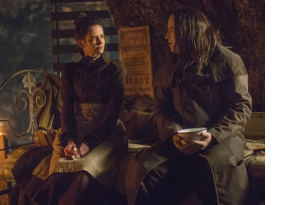I’d like to share a powerful scene from a recent episode of Penny Dreadful, aired on Showtime on Mother’s Day.
Seeking a measure of solace from her struggles, Vanessa Ives (played by Eva Green) has come to volunteer in a cavernous underground serving as a makeshift cholera ward “in the shadow of so much wealth such suffering” of 19th century London.
There she encounters a horrendously scarred man named John Clare (played by Rory Kinnear). Not incidentally but as yet unknown to Vanessa, John is also the sensitive and articulate “monster” reanimated by the Doctor Frankenstein character in the show.
She notices John reading off in an alcove by himself. Intrigued, she approaches him. After an offer of soup and some preliminary introductions, Vanessa sits next to him.
“They make me nervous,” she confides, nodding toward a woman in a habit. “The nuns.”
“Why?” he asks.
“I was raised in the faith,” she admits. “It was arduous for me.”
“Have you religion?” she asks, changing the subject tangentially.
“Are you offering it?” John counters.
“Do you require it?” she answers with another question, smiling warmly.
“I never have,” he replies.
“Then I shan’t offer,” she reassures him. “And I would be a poor advocate. The Almighty and I have a challenging past. I’m not sure we’re speaking these days.”
A laugh comes awkwardly upon John as he returns a confidence. “I read the Bible when I was younger. But then I discovered Wordsworth. And then the old platitudes and parables seemed anemic, even unnecessary.”
“Mr. Wordsworth has a lot to answer for then,” she teases.
Summoning up deeply considered but rarely spoken words, John elaborates. “The glory of life surmounts the fear of death. Good Christians fear hellfire. So to avoid it, they are kind to their fellow man. Good pagans do not have this fear, so they can be who they are. Good or ill, as their nature dictates. We have no fear of God, so we’re accountable to no one but each other.”
“That’s a profound responsibility,” Miss Ives replies.
“And why you do this, no doubt” he asks, “helping those in need?”
“I came here for selfish reasons,” she confesses. “Do you truly not believe in heaven?”
John’s shy self-consciousness is replaced by a joyful radiance. “I believe in this world. And those creatures that fill it. That’s always been enough for me. Look around you – sacred mysteries at every turn.”
“But no exaltation in life beyond this?” Vanessa challenges, seeking confirmation.
“To see a world in a grain of sand, and a heaven in a wildflower. Hold infinity in the palm of your hand. And eternity in an hour,” John responds, paraphrasing William Blake’s “To See A World…”
Vanessa looks a bit sad, “With respect to Blake, I see no wildflowers here, only pain and suffering.”
“Then you need to look closer,” John tells her with compelling certainty.
The conversation is interrupted when Vanessa is called away by a nun who casts a disapproving glance at John.
“Thank you for the soup,” he says.
“Thank you for the conversation,” she answers as she takes her leave. And then, pausing to look back, she adds, “You have beautiful eyes.”
I will not attempt to do a deep analysis of this scene. It is so rich with poetic humanist themes that it is best to let every reader take from it what they will. But I will point out how notable this treatment of humanist ideas is, not only in today’s mass media, but in the context of a show in which demons and by inference god are undeniable realities. It suggests that “even if” god were real, there would still be merit in a purely humanist worldview.
It is certainly not an accident that John, shunned as a monster by his society, was chosen to represent the atheist-humanist character in the show. Of more subtle symbolism is that he is undeniably the product of purely human manufacture. Certainly he was not endowed with a soul by his human creator. Yet he is uniquely passionate and thoughtful with an incredibly “soulful” sense of awe and empathy.
On the other side, Vanessa’s deep faith and powerful mysticism have only left her in desperate need of the comfort and inspiring humanist perspectives offered by this apparent monster.

This really was a stand out scene for me! Great that you picked it out too.
LikeLike
Did you catch the last episode? Another “poetic” conversation between Vanessa and John!
LikeLike
This was my most favorite scene so far in this saga. So glad others are seeing and feeling it as I do. 🙂 Thanks for sharing this.
LikeLike
I’ve been Netflixing penny dreadful on days off and this scene is one of my favorites also. The dialogue in this show is absolutely breathtaking and ingenious. I’ve never come across anything (on television) that can compare.
LikeLike
quite agree. this scene touched me. i did not expect to come across such a beautiful example of Humanism in this show about angels and monsters. how interesting it comes from dr frankenstein’s creation. thank you for typing out the dialog and your analysis.
LikeLike
Nice Site, Keep up the great job. thnx. https://forkweed8.wordpress.com/2017/04/30/lets-talk-tech-smart-happy-tech-dating/
LikeLike